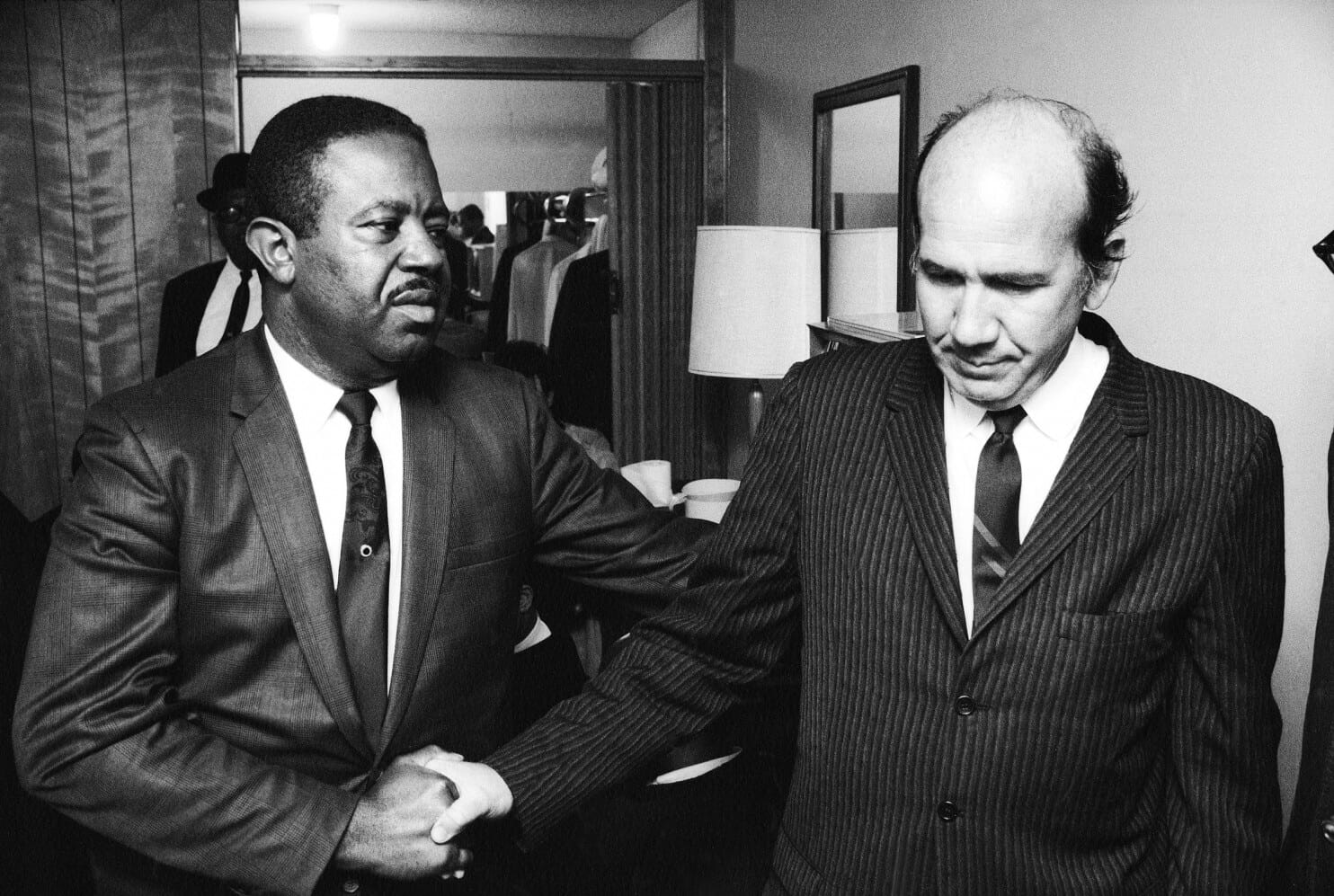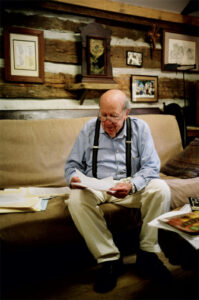Contributors
Allen Boyer: “Brother to A Dragonfly” and “Forty Acres and a Goat”

Will D. Campbell and civil rights leader Rev. Ralph Abernathy, in the Lorraine Motel in Memphis, on the night following the assassination of Rev. Martin Luther King. Photo by Henry Groshinski for Life Magazine.
A classic memoir of the Civil Rights era has been reissued: “Brother to a Dragonfly,” by Will D. Campbell, which was a National Book Award finalist – and with that book its sequel, “Forty Acres and a Goat.” Few memoirs have ever been more eloquent, more earthy, funnier, or more serious.
Will Campbell was from Amite County. He came to Ole Miss in 1954, as Director of Religious Life, a university chaplain. He lasted two years. Massive resistance to desegregation was being organized; Campbell pushed for change until the risks and retaliation became too great. (When he casually played ping-pong in the Old Y Building with a black friend, segregationists struck back by leaving feces floating in the punchbowl of a freshman mixer he had organized.) Campbell moved to Nashville and began working for the National Council of Churches.
“Brother to a Dragonfly” tells two stories – how Campbell worked for the civil rights movement, and how he struggled with his brother Joe. Joe was a small-town pharmacist with a drug problem. Campbell became a tart-tongued, good-natured, crusading minister. Joe was a man who could not resist temptation. He remained Campbell’s confidant: he was not Campbell’s conscience, but perhaps, for Campbell, Joe was a shadow of the Jim Crow South to which Campbell was trying to say goodbye. In the middle of his ministry, Campbell eternally had to deal with his brother’s problems: divorce issues, lost jobs, creditors, and mental hospitals. Their bond was chafing, wearying, and unsnappable.
“Forty Acres and a Goat” features wittier writing and a steadier narrative line. The goat was a family pet, Jackson. The forty acres were perhaps the Campbell family farmstead outside Nashville, or perhaps a metaphor for the social acreage that Campbell tended as a pastor. The book traces Campbell’s civil rights work, from lunch counter sit-ins to rallies led by the Southern Christian Leadership Conference, from Nashville to Memphis to the Mississippi Delta.
In the introduction to this edition, Congressman John Lewis recalls:
“During the civil rights movement, when we were developing strategies, someone usually said, ‘Call Will Campbell. Check with Will.’ Will knew that the tragedy of Southern history had fallen on our opponents as well as our allies . . . . That insight led Will to racial healing and equity, pursued through courage, love, and faith as the path to spiritual healing for all.”
“Brother to a Dragonfly” is the work of a gadfly. “Forty Acres and a Goat” is the testament of a minister who strove to reach to meet every need that he could see. “There is one question I have long harbored,” Campbell writes: “Jesus, what was it with you and goats? He never seemed to like them. . . Sheep are loving and compassionate. Goats leave people hungry, naked, and in prison and do not visit them.”

Will Campbell edits a manuscript in his log-walled farmhouse at Mount Juliet, Tennessee. Campbell published seventeen books. Photo by Al Clayton.
Campbell’s faith was deep enough for him to jest about its ironies. Beyond that, his ministry led him to tend goats – minister to people whom other activists ignored. He was in Little Rock to escort black students to white schools and at the Lorraine Motel the night that Martin Luther King was killed. He also ministered to a Grand Dragon of the Ku Klux Klan, jailed for contempt of Congress. (“When Isaiah and Jesus said that they had come to proclaim release to prisoners, they said nothing of the prisoner’s crime. Nothing was said about this or that ideology allowing for distinctions of our own.”) The Grand Dragon left prison and denounced the Vietnam War, side-by-side with his Black Muslim prison-mate.
“I resolved to be a Baptist preacher of the South until the day I die,” Campbell reflects. “Though never again a Southern Baptist preacher. . . . I knew there was a difference.” Briefly, Campbell served as an Episcopal lay reader. To avoid confusion, he had business cards printed that read, “with an instant loyalty oath,” “WILL D. CAMPBELL – I am not now, nor have I ever been, an Episcopal priest.”
The bishop did not renew his reader’s license. But that sally says volumes. If any parishioners ever dozed off while Brother Campbell was preaching, they must not have been listening.
Allen Boyer, Book Editor for HottyToddy.com, is a native of Oxford. He lives and writes on Staten Island. His book “Rocky Boyer’s War,” a WWII history drawing on his father’s diary, will be published this month by the Naval Institute Press.
For more questions or comments email us at hottytoddynews@gmail.com.





























